Fake Guitars, Fake iPODs, and Other Counterfeits
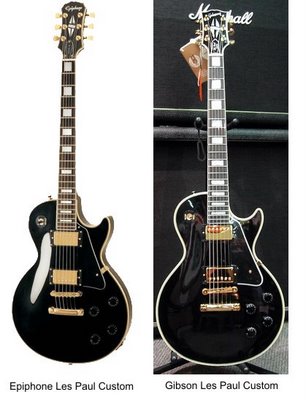
In the picture shown above, the guitar on the right is a Gibson Les Paul Custom. The so-called "Black Beauty" and it sells for $3654.99 at Musiciansfriend.com and at similar prices in most guitar stores. On the same webstore, the guitar on the left, the Epiphone Les Paul, also by Gibson, sells for $699.99. To play them, it's hard to tell the difference. Many would say that the only difference is the name on the headstock.
So these are legitimate copies. They are done to allow Gibson access to the lower priced guitar market without sacrificing their high-margin, high-end market. They make far less margin on the cheaper line, but the idea is to have them manufactured in China with cheaper labor to reduce costs as much as possible, and then make up the rest of the difference by selling a much larger volume to a broader market. The Gibsons might sell to the pros and the serious amateur players, but the Epiphones can sell to any teenager who has a passing notion to learn guitar.
However, there are many copies that are not legitimate. They are earnestly trying to misrepresent their guitars as the famous brand names they appear to be.
The other day I went to a garage sale because the guy had a nice flame-top Les Paul, a strat for $200, and brand new Tele for $150, and some flight cases for around $40 each.
When I got there, there was a mountain of stuff - mostly junk - in this guy's backyard and garage.
The Les Paul was a gorgeous flame-top Gibson Les Paul Classic, but he wanted $1800. Not a terrible price if I was buying it from a reputable store, but not from a guy selling off a pile of junk out of a garage.
The Tele was just a Squire Tele, so it was only barely worth the $150 brand new from a store. And the Strat was an anomaly.
It was very old and worn.
It had a large 70's-style headstock, and the finish was worn through enough to be that old, but a couple things didn't add up...
The headstock sticker did not say made in USA, or made in Mexico, or Korea, or Japan. I have never seen a legitimate Fender not say where it was made SOMEWHERE. Many of the American ones say it on the back of the headstock. Also, this has no serial number anywhere. Also, the neck did not have a one-piece maple neck, it had a maple fretboard, mounted on another white wood, but the grain was something different. Ash maybe? I don't know. Then the bridge was like the modern style saddles, but the headstock was like the 70's style.
My conclusion was that the guitar is a counterfeit. It's probably a Squire Strat and someone sanded off the name sticker and created their own Fender Stratocaster sticker and left off the Made In USA and the serial number (since that would give it away). For 200 bucks, you can buy a brand new Squire strat if that's what you want.
Then, about a month ago, I checked out a bunch of Les Pauls for sale on eBay. There are warnings about these guitars. They are sold from China and look exactly like Gibson Les Pauls and have the same logo and name plates, etc. but they are made in a factory in China.
That's not that hard to do. The Epiphone factory in China makes Epiphone Les Pauls that look exactly like the Gibsons they copy, but they sell for $500 full retail instead of $3000 or more.
It would be a relatively minor thing to change the name on the headstock to say Gibson instead of Epiphone and few would know the difference. Especially now that the Epiphones are using the Gibson pickups as well.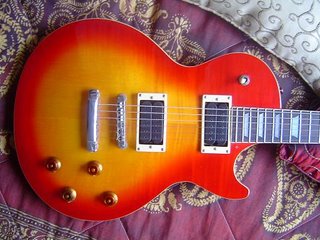 But that's Epiphone, a brand name owned by Gibson, and authorized to sell copies. The guitar pictured here is an Epiphone Les Paul Standard. Other than the name and headstock top edge, it's indistinguishable from the original Gibson Les Paul Standard pictured below.
But that's Epiphone, a brand name owned by Gibson, and authorized to sell copies. The guitar pictured here is an Epiphone Les Paul Standard. Other than the name and headstock top edge, it's indistinguishable from the original Gibson Les Paul Standard pictured below.
These other fake guitars are something different. They often have an ebay price of $5 or something, but the shipping from China is $250 british pounds, which ends up being about $400-$500US anyway. So the real price of the guitar is buried in the shipping charges rather than the price. That cheats ebay out of their commission, and also allows them to say they will refund your money for the guitar, but not of course the shipping charges. That means if you are unhappy, you get your $5 back. But you're still out the $500 for shipping.
The warnings that are out there are all about how these are cheap imitations, though. Pickups don't work. Bridges snap strings, knobs fall off, tuning machines can't hold it in tune, etc.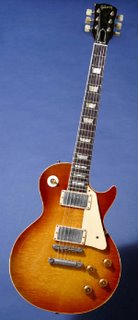 If you look carefully, there are subtle differences between the Epiphones and the Gibsons. Like the fretboard on a Les Paul Custom should be ebony, but on the Epiphone copy of a Custom it is only rosewood. And the very top edge of the Epi is sculpted a different shape than the traditional Gibson mustache-shape, etc. But other than that, they are very very close. Fit and finish are hard to tell apart. The Epis are actually excellent value for the money, in fact.
If you look carefully, there are subtle differences between the Epiphones and the Gibsons. Like the fretboard on a Les Paul Custom should be ebony, but on the Epiphone copy of a Custom it is only rosewood. And the very top edge of the Epi is sculpted a different shape than the traditional Gibson mustache-shape, etc. But other than that, they are very very close. Fit and finish are hard to tell apart. The Epis are actually excellent value for the money, in fact.
But these fakes from China seem a little more obvious. Like maple neck on a Gibson Les Paul instead of mahogany, or clear-finish maple top, or wrong tuners, or whatever. You have to know what to look for.
This one here is an original Gibson Les Paul from 1960. This guitar is probably worth over $100,000. The Epiphone version of this costs about $500. The differences are miniscule. Hardly worth $100,000. 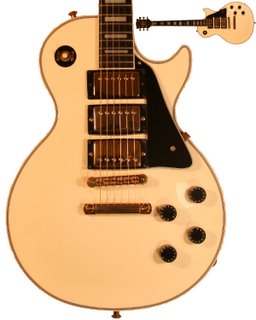 Here you see a photo of my own personal 1989 three-pickup white Gibson Les Paul Custom. A very rare guitar. The list price from Gibson was $5995. It plays and sounds beautifully. A wonderful and powerful guitar, made to play and feel like a jewel. A particularly HEAVY jewel, I might add. This guitar weighs in at over 13 lbs. Try playing with that around your neck for a whole 2 hour show!
Here you see a photo of my own personal 1989 three-pickup white Gibson Les Paul Custom. A very rare guitar. The list price from Gibson was $5995. It plays and sounds beautifully. A wonderful and powerful guitar, made to play and feel like a jewel. A particularly HEAVY jewel, I might add. This guitar weighs in at over 13 lbs. Try playing with that around your neck for a whole 2 hour show!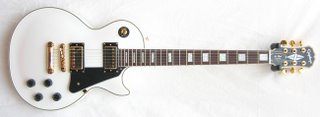 And below we have a similar Epiphone copy of the Gibson that sells for about $699. This one only has the two pickups, but they do make the three pickup as well. The difference in color is only due partly to lighting and partly due to age. The white color deepens into a creamy yellow with age. They become more desirable as the age. As all Les Pauls do. Other than that, the Gibson and Epiphones are very similar.
And below we have a similar Epiphone copy of the Gibson that sells for about $699. This one only has the two pickups, but they do make the three pickup as well. The difference in color is only due partly to lighting and partly due to age. The white color deepens into a creamy yellow with age. They become more desirable as the age. As all Les Pauls do. Other than that, the Gibson and Epiphones are very similar.
Many of the fakes from China are easily recognizable, but not all. Some of them are indistinguishable from the original. So if someone buys one of these Chinese fakes, and re-sells it here in the US as an original, how would you know? And for that matter, if you can't really tell the difference, does the difference really matter? And if so, how? If you pay $1500 for a used Gibson Les Paul and you get what appears to be a Gibson Les Paul, and what sounds like a Gibson Les Paul, does it make a difference if it started out as a $400 replica?
I would wonder about the serial numbers. Did they also replicate the appropriate serial numbers to make it seem legitimate?
Would you buy one? What do you think about the possibility that you might end up getting a fake while thinking you are buying an original? Does it make a difference that no one, including you could tell ? (if the replica is very good) If you bought it as a Gibson and could sell it to someone else as a Gibson, the whole time thinking it was really a Gibson - does it make a difference? If that does bother you, how could you ensure that you AREN'T buying a replica? (assuming they use accurate serial numbers)
Then, yesterday I heard on NPR radio about a whole large stock of fake iPODs that came out of China and are now flooding the world. They are in Mexico city right now. They look exactly like, and play and sound exactly like the Apple iPOD, but instead of costing $300 and $400, they cost $129.
Would you buy one?
iPOD has cornered the market on MP3 players. over 75% of the US market is iPOD. Everybody wants one. But they are expensive, and so the market is ripe for replicas. Ironically, that was what made the IBM PC the world standard for computers instead of the Apple Macintosh. Everyone copied the PC until it became the defacto standard computer. Meanwhile the MAC has remained a niche market - though still thriving.
Then there are the fake copies of software out there from Windows to Ms OFFICE, to graphics programs to whatever. There are also generally made in China.
Then there are the fake music CD's that are being produced in Mexico. Somebody just had their warehouse raided. It was full of blank CD's and all the fixin's to reproduce popular music CD's with identical covers and packaging, etc. and sell them through internet and flea markets, etc. for $5 each instead of the full $15 to $20 each through legit channels and paying the record label it's share.
Then there is the whole issue of generic drugs. One pharmaceutical spends a few hundred million dollars to develop a new drug, and then once they bring it to market, others copy their patent and start making it and selling it at a fraction of the cost. What do you think about that? If you need the drug for your health and the generic drug costs $20, but the original name brand costs $60 (because they are trying to recoup their research and development investment) which would you buy?
How about replica perfumes? If it smells exactly like Chanel Number 5 but costs $15 instead of $250, is it better to buy that? Is it a good deal? Are there risks? What is the downside?
What about the famous Rolex watch copies? Everyone has seen or at least heard of fake Rolex watches that look like the real thing but sell for $30 instead of $5000. A close relative of mine paid over $8,000 for a very fancy Cartier dress watch. I showed him a website where he could buy a very high quality replica of the exact same watch for around $249. That is not a cheap watch, it's very good quality. No doubt, it keeps perfect time and would last as long as the original Cartier watch. And the copy is so good that even a jeweler cannot tell the difference unless he opens it up, takes out his magnifying glass and looks up the part numbers on the components on his manufacturer order sheets. They even have believable serial numbers. No one that he meets in a business meeting could ever possibly tell that it was a replica Cartier. In fact, the cruel irony of it is that most people would assume that the watch is a replica whether it is or isn't - so even the bragging effect of it is lost, unless you go around pointing out to people you wish to impress that you actually paid $8,000 for a genuine brand name article. I think any points you hoped to make by impressing someone with that fact would immediately be cancelled out by the crass over-materialistic superficiality of the gesture. And so the value from the $8000 is lost completely.
But if you wanted the impressiveness factor without spending the big money, it's easy enough to get the replica watches. Or Cubic Zirconium diamond jewelry as well. Some of those manmade diamonds are hard to tell from the authentic thing without a jewellers loop and a gemologist's diploma. So is there value in paying for the original higher-priced item?
What about you? Do you buy based upon principle or practicality?
What do you think about the counterfeits? Are replica guitars the same as replica iPODs, replica software and replica drugs?
There is also the question "What is the real value of these things?" From a larger perspective, if a company in China can produce a product like a Les Paul style guitar identical in every way to the original guitar made by Gibson in Nashville, however the one made in China can be manufactured, shipped to the US, and sold for $400, is that the real value of the product, and the Gibson price of $3800 is just ridiculously high and just simply price-gouging for the same thing?
What is your opinion on all this?


0 Comments:
Post a Comment
<< Home